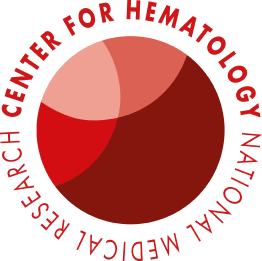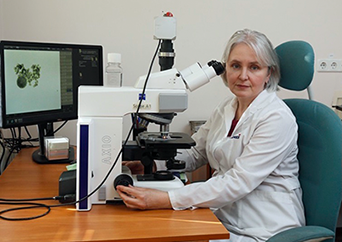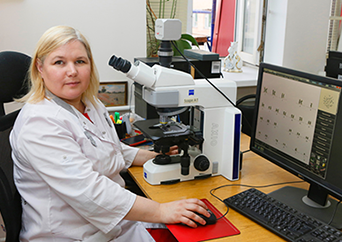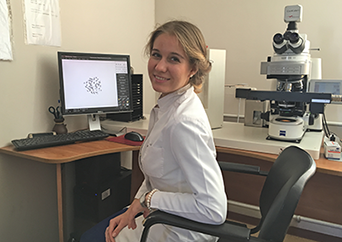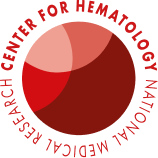
Head of the laboratory- doctor/aboratory geneticist, Tatiana N. Obukhova, Candidate of Medical Sciences
The Laboratory of Karyology was established at the Hematological Research Center of the Russian Academy of Medical Sciences, headed by Academician Andrei I. Vorobyov in 1988 for the practical implementation of cytogenetic research methods in clinical hematological practice, first on the scale of what is now the NMRC for Hematology, and then throughout the country. The ideological inspirer for the organization of the laboratory was the outstanding Russian hematologist Marina Davydovna Brilliant. The first head of the laboratory (1988- 2013) was Professor Elena V. Domracheva. Since 2013, the laboratory has been headed by T.N. Obukhova.
The main focus of the Laboratory of Karyology is the study of the genetic structure of tumor diseases of the blood system - the determination of the main molecular cytogenetic events underlying the initiation and progression of tumors as well as the development and improvement of methods for the molecular cytogenetic diagnosis of leukemia and lymphomas with the goal of identifying diagnostic chromosomal markers and cytogenetic disease prognosis factors for the selection of differentiated therapy and evaluation of the treatment effectiveness.
The laboratory specializes in cytogenetic and molecular-cytogenetic diagnostics of acute leukemia, myelodysplastic syndromes, chronic myeloid leukemia and other myeloproliferative diseases, chronic lymphocytic leukemia, lymphomas, multiple myeloma, and myeloid and lymphatic tumors occurring with eosinophilia. In methods of standard cytogenetic study (karyotyping) and molecular cytogenetic study (fluorescent in situ hybridization - FISH) of bone marrow cells and peripheral blood, tumor biopsy specimens are used. FISH is also performed on archival material: paraffin blocks and biopsy prints, bone marrow and blood smears. In addition, high-resolution methods for identifying complex structural rearrangements with multicolored coloration of chromosomes are used - M-FISH and M-BAND. For patients with aplastic anemia, myelodysplastic syndromes and acute leukemias, a diepoxybutane test (DEB test) to detect chromosomal instability and Fanconi anemia is performed. In the framework of scientific research, a modern high-resolution molecular-cytogenetic method is used – comparative genomic hybridization on DNA microarrays (comparative genomic hybridization, array CGH) in order to identify hidden chromosomal aberrations and determine prognostically significant markers of onco-hematological diseases.
The laboratory is equipped with the latest generation of light and fluorescent microscopes Carl Zeiss (Germany) with automatic metaphase search systems (Metafer); software for analyzing images of differentially colored chromosomes (IKAROS) and FISH stained preparations, including mFISH/mBAND (ISIS, MetaSystems, Germany); an automated DNA microchip scanning system, including Surescandx fluorescent signal scanner (Agilent Technologies, USA); the software “Agilent Cytogenomics” and “Cyto Sure Interpret Software” (OGT, UK) for analysis and interpretation of array CGH results, as well as other modern equipment.
Highly qualified laboratory specialists perform more than 6,000 diagnostic tests per year for patients from the clinical departments of the NMRC for Hematology, institutions of the city of Moscow, and regions of Russia and neighboring countries.
The laboratory also carries out teaching activities: clinical residents and graduate students are trained; doctors of clinical laboratory diagnostics and laboratory geneticists from the regions of Russia improve their qualifications under additional professional education programs; laboratory staff give lectures at advanced training courses for hematologists.

